Taiwan Tech partners with Indonesia on sustainable carbon-reduction strategies.
To deepen cooperation between Taiwan and Indonesia in the field of circular economy, Taiwan-Indonesia Science and Technology Innovation Center (TI-STIC) of Taiwan Tech held the Low Carbon Construction Forum on August 21 at the Sepuluh Nopember Institute of Technology
(ITS) in Surabaya, Indonesia. This marked the third international applied research forum jointly organized by Taiwan and Indonesia. Building on the discussions of the first two forums, which focused on electronic waste and plastic waste management, this year’s forum further concentrated on carbon-reduction strategies and innovative technologies in the building and construction industry, attracting enthusiastic participation from representatives across industry, government, and academia in both countries.
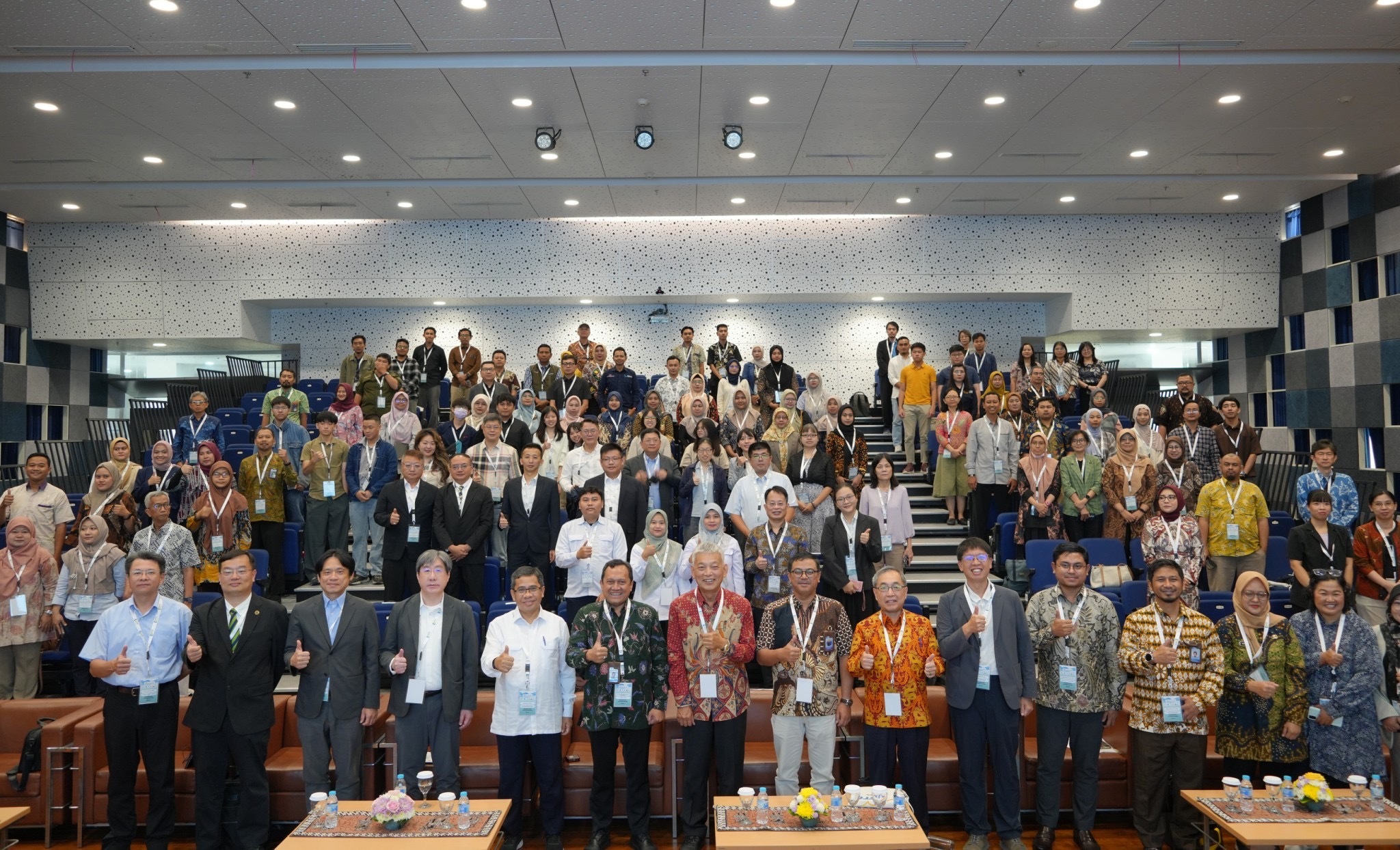
Taiwan-Indonesia Science and Technology Innovation Center (TI-STIC) of Taiwan Tech held the Low Carbon Construction Forum on August 21 at the Sepuluh Nopember Institute of Technology (ITS) in Indonesia, focusing on carbon-reduction strategies and innovative technologies in the building and construction industry, and drawing active participation from representatives of industry, government, and academia from both countries.
According to United Nations data, the building and construction sector is one of the world’s major sources of greenhouse gas emissions, accounting for about 37% of total emissions. In addition to energy use in buildings - such as heating, cooling, and lighting - the production processes of construction materials like cement, steel, and aluminum generate substantial carbon footprints. As a result, low-carbon construction has become a key direction for global sustainable development, requiring improvements in energy efficiency, reductions in emissions during construction, and the promotion of environmentally friendly building materials to lessen the industry’s overall environmental impact.
Dr. Agus Muhammad Hatta, Vice President of the Sepuluh Nopember Institute of Technology (ITS), noted that the theme of this forum aligns with Indonesia’s policy goal of achieving net-zero emissions by 2060. The Indonesian government is actively advancing renewable energy and energy-saving technologies, with particular emphasis on applying solar power in both public and private sector buildings. He stressed that the promotion of low-carbon construction requires close collaboration among academia, industry, and government to ensure effective policy implementation and to accelerate sustainable transformation.
The forum invited representatives from the building and construction industries as well as academia in both Taiwan and Indonesia to share innovative technologies. Po-Yu Tang, Chairman of King Ho Tai International Co., Ltd., a Taiwanese asphalt supplier, introduced the company’s globally pioneering room-temperature cold mix green asphalt made with recycled materials and aggregates. This technology, which has received international patents, not only significantly reduces energy consumption and carbon emissions but also demonstrates the potential of advancing circular economy practices in the construction industry. Jui-Tsun Chien,Vice President, Hao-Sheng Industrial Co., LTD, a Taiwanese supplier of Controlled Low Strength Material (CLSM), shared the company’s quality control experiences in waste-reuse technologies, highlighting the tangible results of circular economy applications in the building materials sector.
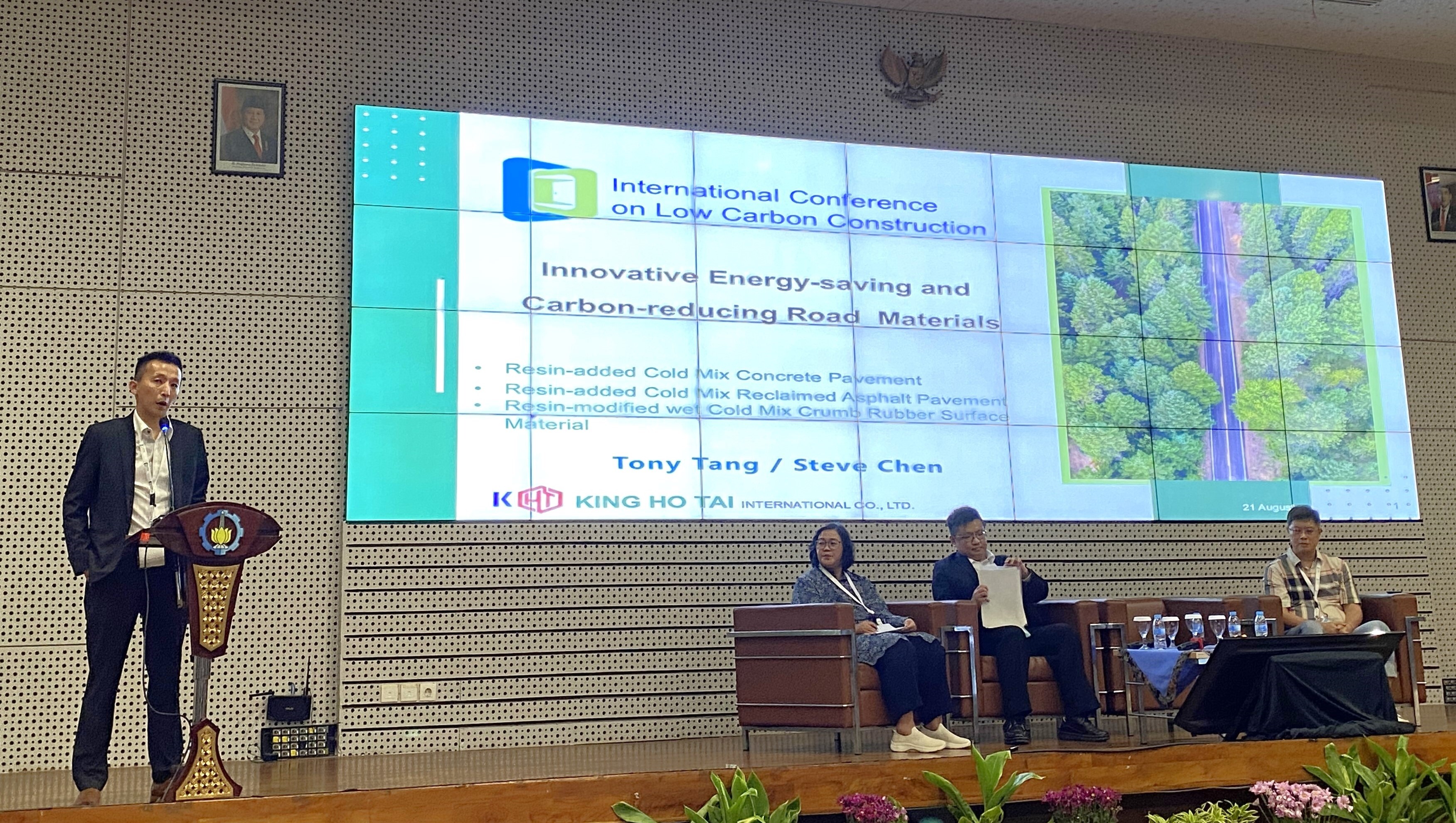
Mr. Po-Yu Tang, Chairman of King Ho Tai International Co., Ltd., shared the company’s internationally patented green and low-carbon asphalt technology.
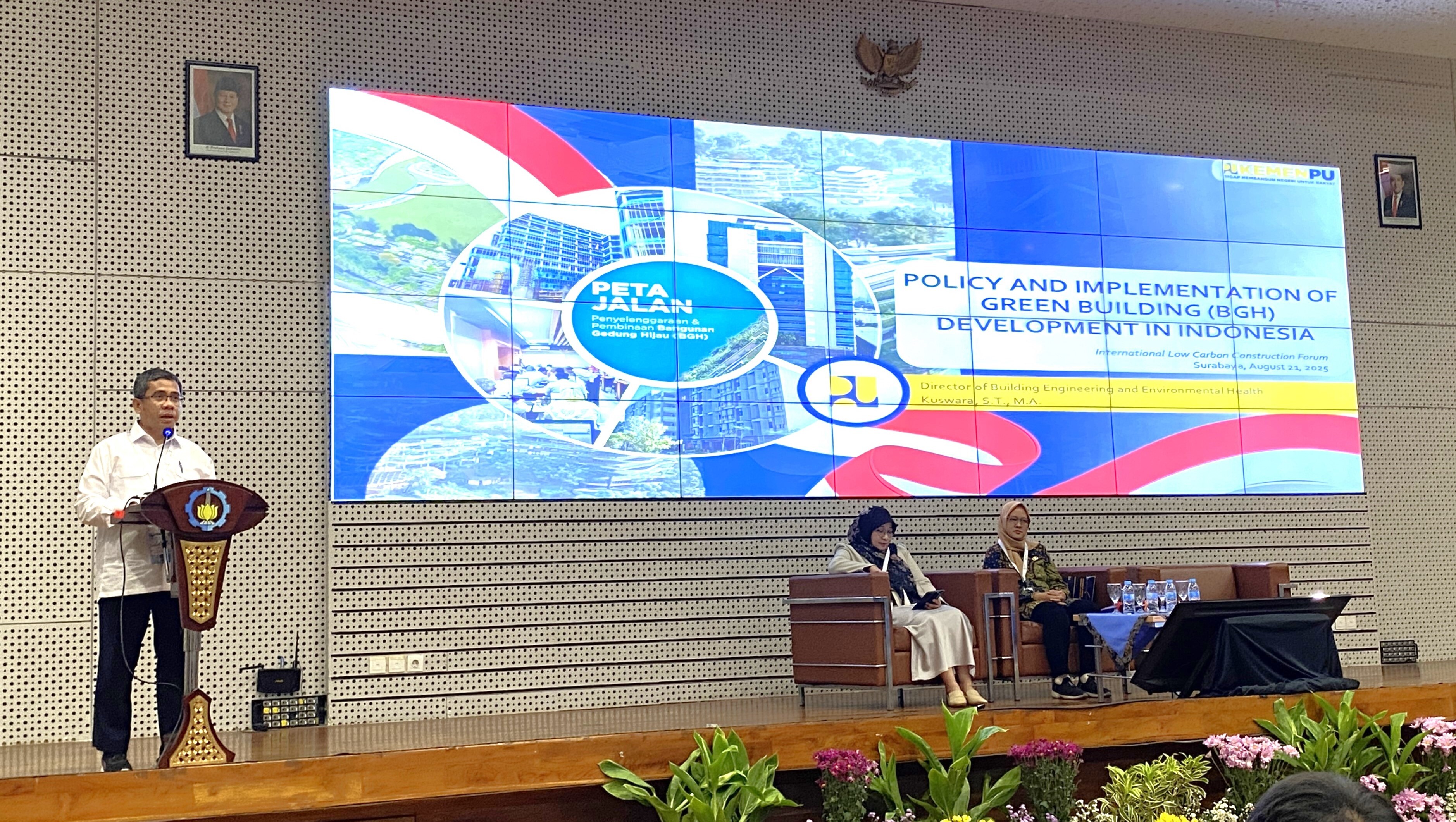
Kuswara, S.T., M.A., Director of the Directorate of Building Engineering and Environmental Sanitation at Indonesia’s Ministry of Public Works, delivered a keynote speech titled “Policy and Regulatory Developments in Indonesia’s Housing and Infrastructure”. In his address, he outlined Indonesia’s latest policy directions and regulatory plans for advancing housing and infrastructure, echoing the international trend toward low-carbon sustainable development.
Indonesian scholars also presented innovative research. Professor Antoni from the Department of Civil Engineering, Petra Christian University,Surabaya, Indonesia, shared his work on “self-cementing fly ash low-carbon concrete technology”, highlighting the potential of turning industrial by-products into valuable resources. Professor Asdam Tambusay from the Department of Civil Engineering, ITS, Surabaya, Indonesia, delivered a presentation on “alkali-activated concrete for structural applications”. His research showed that this material exhibits stiffness, strength, and fracture patterns comparable to those of traditional Portland cement concrete, while reducing embodied carbon emissions by up to 75%, underscoring its potential as a next-generation low-carbon construction material.
From Taiwan, Hsin-Hung Lin, Assistant Engineer at Taiwan Construction Research Institute, introduced successful cases of resource waste reuse, emphasizing the importance of circular utilization. Feng-Ju Li, Associate Technical, Resource Circulation Administration, Ministry of Environment, Taiwan, presented on “Taiwan’s Inorganic Resource Recycling Policies and Experiences”. She noted that Taiwan generates about 17 million tons of inorganic resources annually, mainly reused as recycled aggregates in civil engineering, construction, and port backfilling. She also pointed out three major challenges: reducing landfill volume, promoting recycled aggregates as substitutes for natural ones, and establishing a graded application system. Taiwan aims to increase the utilization rate of recycled inorganic aggregates to 88% by 2030 through revisions to construction standards, the establishment of certification and traceability systems, and further promotion of circular economy practices and carbon reduction.
In addition to industry case studies, academics also offered perspectives. Professor Min-Chih Liao from the Department of Civil and Construction Engineering at Taiwan Tech discussed “low-carbon road materials and balanced mix design”, analyzing the development and application of new low-carbon materials and emphasizing their critical value in sustainable construction and carbon-reduction strategies. Jieh-Haur Chen, Distinguished Professor, Department of Civil Engineering; Director, Research Center of Smart Construction; and Associate Dean, College of Engineering, National Central University, Taiwan, introduced “smart construction and carbon reduction”, where artificial intelligence is applied to steel fabrication processes and intelligent coating systems to improve efficiency and reduce emissions. Yu-Min Su, Assistant Professor, Department of Civil Engineering, National Kaohsiung University of Science and Technology (NKUST), Taiwan, presented his research on “low-carbon, low-modulus concrete pavements”. These diverse topics sparked enthusiastic discussions among participants, reflecting how low-carbon construction has become a shared focus of academia, industry, and research communities in both Taiwan and Indonesia.
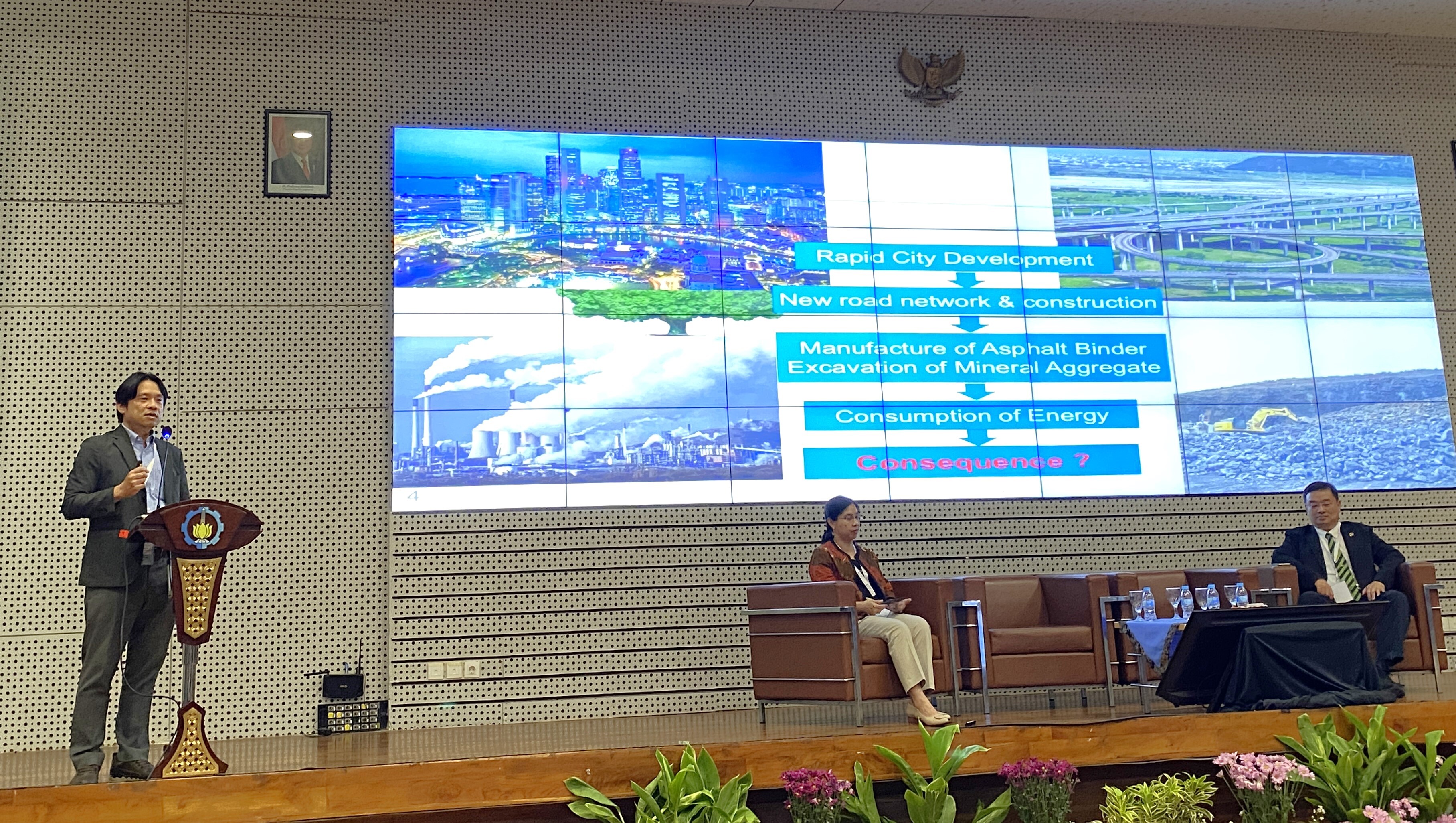
Professor Min-Chih Liao from the Department of Civil and Construction Engineering at Taiwan Tech discussed “low-carbon road materials and balanced mix design” from an academic perspective, providing an in-depth analysis of the development and application of new low-carbon materials and underscoring their critical value in sustainable construction and carbon-reduction strategies.
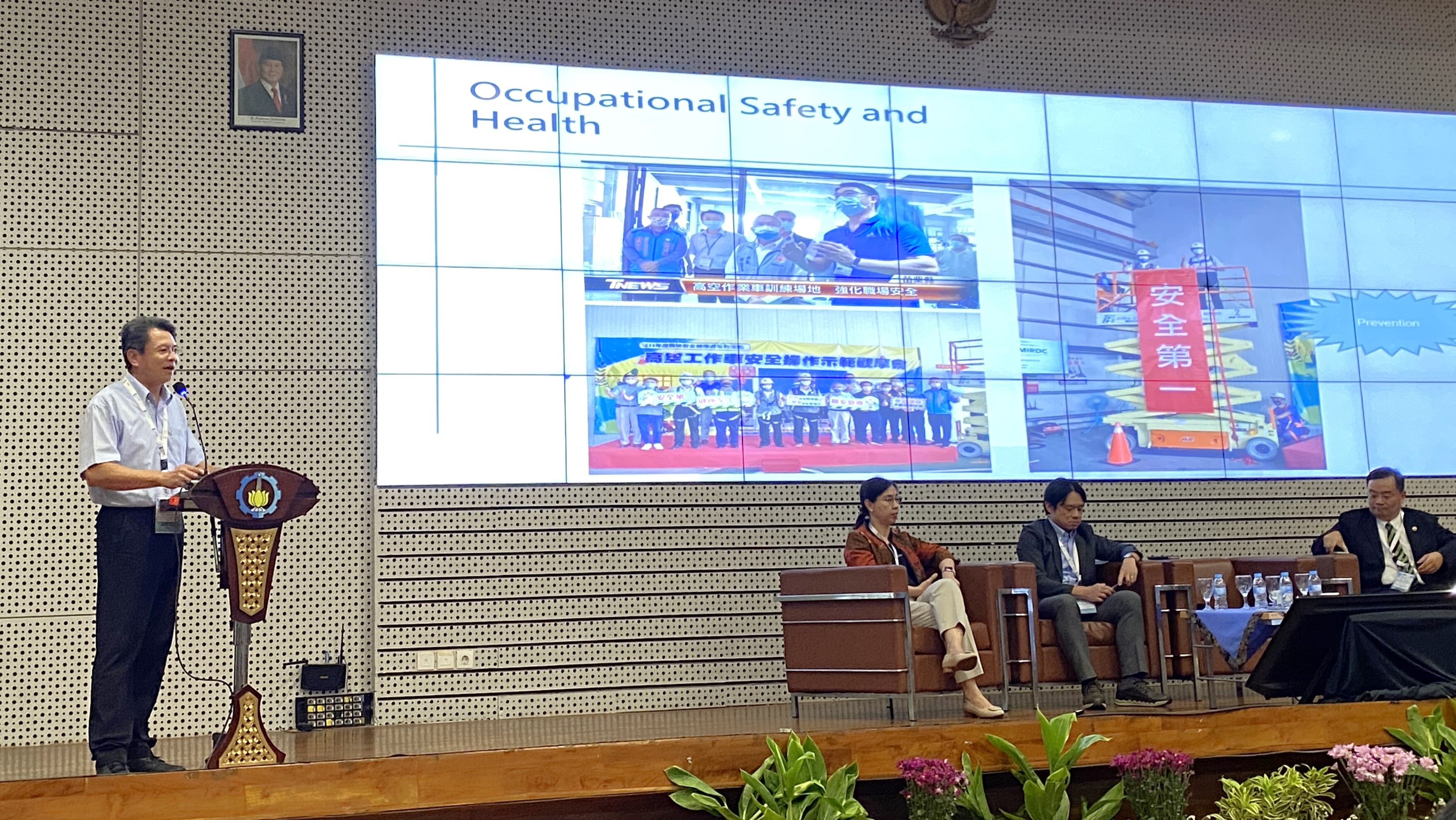
Jieh-Haur Chen, Associate Dean of the College of Engineering at National Central University, presented on “smart construction and carbon reduction”, demonstrating how artificial intelligence can enhance steel fabrication processes and intelligent coating systems to improve efficiency and reduce emissions.
The Taiwan-Indonesia Science and Technology Innovation Center was established in 2021 with support from Taiwan’s National Science and Technology Council (NSTC), jointly organized by Taiwan Tech, Widya Mandala Catholic University Surabaya (UKWMS), and the Sepuluh Nopember Institute of Technology. The center has long focused on research and applications in the fields of circular economy and waste reutilization. This forum echoed the United Nations Sustainable Development Goals (SDGs), including Goal 9 “Industry, Innovation and Infrastructure,” Goal 11 “Sustainable Cities and Communities,” and Goal 13 “Climate Action.” It not only deepened academic, industrial, and governmental exchanges between Taiwan and Indonesia but also showcased the concrete results of transnational collaboration in advancing low carbon construction and green transformation.
Through this forum, Taiwan Tech, together with its Indonesian partners, demonstrated Taiwan’s innovative capacity in research and industry as well as Indonesia’s strong policy commitment, jointly creating a new paradigm for low-carbon construction and laying a solid foundation for a greener, more sustainable future in the Asia-Pacific region.
